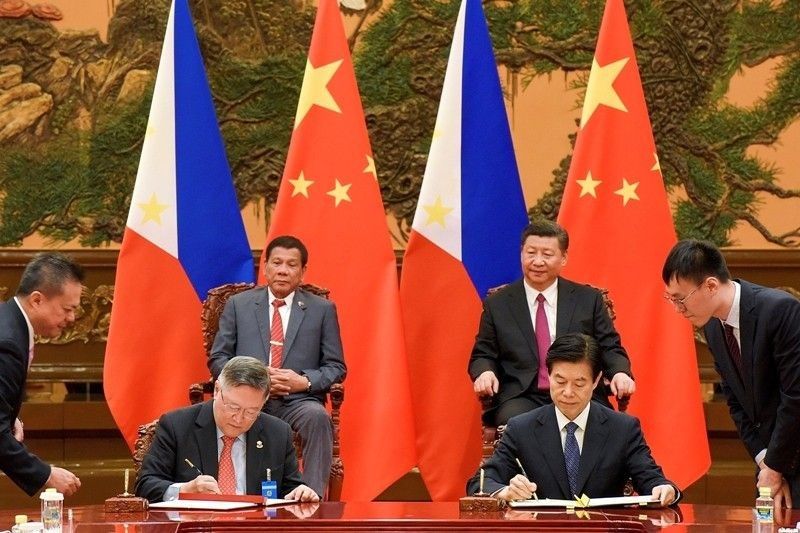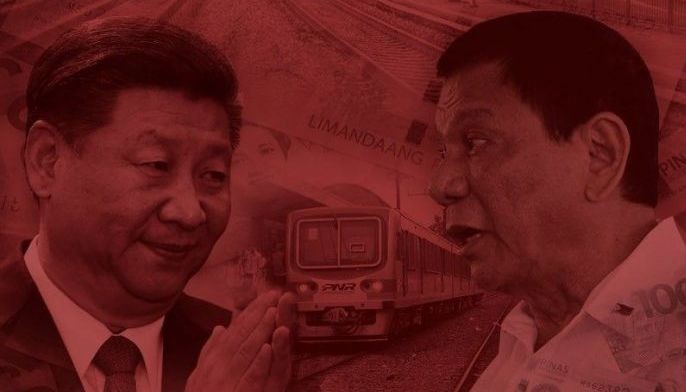Commentary: The geo-political fault line in Philippine society

During his six-year term, Philippine President Benigno Aquino III pursued a balancing or a challenging policy on China's expansive maritime claim in the South China Sea. He countered China by shifting the Armed Forces of the Philippines' focus from domestic security to territorial defense. This included bolstering closer Philippine-U.S. security relations, acquiring American military equipment, seeking from Washington an explicit security guarantee under the 1951 Mutual Defense Treaty, and promoting a strategic partnership with Japan.
In April 2014, the Philippines signed the Enhanced Defense Cooperation Agreement with its strategic ally—the U.S. Designed to constrain China, the agreement provides American forces strategic footprint through rotational presence in Philippine territory. Aquino has built a geo-political divide between the Philippines and this emergent East Asian power as he challenged China's maritime expansion in the South China Sea.
Duterte is bent on unraveling the foreign policy agenda of his predecessor as he heeded China's advice to manage the two countries' territorial dispute through bilateral negotiations. He sidelined the 2016 United Nations Convention Law of the Sea Awards to the Philippines. He also downplayed the South China Sea dispute in the 2016 Association of Southeast Asian Nations summit meeting in Laos.
He declared that he wanted to distance the Philippines from the United States, a move that will not only alter the region's strategic balance but mark a dramatic departure from his country's long-standing policy of maintaining close security ties with its only strategic ally. He has actively sought Chinese financial assistance for the construction of drug-rehabilitation centers for Filipino drug dependents and soft loans for the constructions of railways and roads in Mindanao and in other parts of the country.
Duterte has created the geo-political fault line deep inside Philippine society by adopting a policy of appeasement towards China.
The unfulfilled promise of appeasement
The Duterte administration's appeasement policy is based on a quid pro quo with China. Duterte would unravel his predecessor's balancing policy on China's maritime expansion in the South China Sea. This was in exchange for Chinese moderation in their actions vis-à-vis the Philippines in the South China Sea.
And more significantly, the infusion of Chinese investment and aid for the Duterte administration's five-year massive infrastructure program “Build, Build, Build.” Despite the two countries' rapprochement since 2016, however, a large portion of the money that China promised to the Philippines has never seen the light of day because of either cancelation or delay in the disbursement of Chinese-funded infrastructure project.
During his 2016 visit to Beijing, Duterte announced that he collected US$24 billion in investment pledges to finance his administration's infrastructure agenda. However, according to a study by Alvin A. Camba of John Hopkins University in Washington D.C., of this US$24 billion in pledges, US$15 billion were negotiated between private businessmen that were eventually modified or cancelled. The rest of the projects have been stalled because they are hard to implement such as rail networks and irrigation dams.
He also observed that while Chinese private investments increased by US$1.04 billion in March 2018, there has been a lackluster turnout of large-scale Chinese infrastructure or manufacturing investments, which occur through the establishment of new major companies, the construction of infrastructure, and the generation of positive spillovers on the Philippine economy.
In August 2018, Philippine Secretary of Finance Carlos Dominguez confirmed the slow flow of Chinese public sector investment. He admitted that there had been “roadblocks” on the flow of Chinese Official Development Assistance (ODA), particularly Beijing's hesitation to co-finance certain projects with other lenders and use of renminbi in ODA disbursement instead of dollar.
He also revealed that securing ODA from China had been delayed because of the reorganization of the Chinese government in early 2018. Prior to President Xi Jinping's visit to the Philippines on 20 Nov. 20, 2018, Philippine government officials admitted that among the 10 big-ticket projects in the country that China promised to finance, only one loan agreement—the US$62.09 million Chico River Pump Project—has been finalized.
The geo-political fault line in Philippine society
Domestic opposition against growing Chinese presence in the country has also delayed the implementation of many infrastructure projects under China's Belt and Road Initiative (BRI). Public mobilization and opposition stems from the widespread fear of China as a security threat that have often outweighed the economic benefits of Chinese public investments.
Strung by the public's general distrust of China, Duterte told his countrymen that he expected China to be fair on the South China Sea dispute and so they should accept Beijing as a good neighbor. He assured the Filipinos: “I am sure that in the end, China will be fair and the equity will be distributed.”
The Philippine public, however, does not share their president's patronizing view of China. Opposition figures and left-wing organizations have often criticized the Duterte administration for not publicly raising alarm and indignation over Chinese efforts to militarize the land features it occupies in the South China Sea.
The public's skeptical view on the Sino-Philippine rapprochement was reflected by the Social Weather Stations (SWS) June 2018 nationwide survey that revealed that 4 out of 5 Filipinos repudiated the Duterte administration's policy of tolerating Chinese intrusions in the Philippines' Exclusive Economic Zone (EEZ) in the West Philippine Sea.
It showed that 81 percent of the Filipinos believe that is not right for the government to do nothing about China's intrusion on Philippine claimed territories. Majority of the respondents also has a negative trust rating of China. Interestingly, while most of the respondents approve of the president's performance, they reject his appeasement policy on China.
During President Xi Jing Ping's state visit to Manila on Nov. 20, 2018, the Social Weather Stations released its Third Quarter 2018 survey that reaffirmed the Filipinos' view on the South China Sea dispute and their general distrust towards China.
According to the survey, 84 percent of the respondents do not approve of the government's inaction on China intrusion into the country's EEZ and 87 percent believe that it is important for the Philippines to reclaim its control of the islands occupied by Chinese forces. The survey also observed that Filipinos have a favorable view of the United States. However, they distrust China because Filipinos are aware of the territorial dispute in the South China Sea.
Presidential spokesperson Salvador Panelo slammed the SWS and questioned the timing of its release—on the day of Xi's arrival in Manila. He explained that it was only natural for the Filipinos to trust the U.S. and Japan more because they have been allies of the Philippines for a longer period of time.
He added: “Our country's renewed ties with our giant neighbor in the North provides us a welcome opportunity for the public to know and understand China better. It does not happen overnight, but we are confident that a more favorable public appreciation of China could happen in the future.” His statement tacitly accepted the geo-political fault line in Philippine society caused by the Duterte administration's efforts to appease China so that the country can avail of Chinese loans to finance the government's infrastructure building program.
Dr. Renato Cruz de Castro is a trustee and convenor of the National Security and East Asian Affairs Program of the Stratbase ADR Institute, a partner of Philstar.com.
- Latest

























